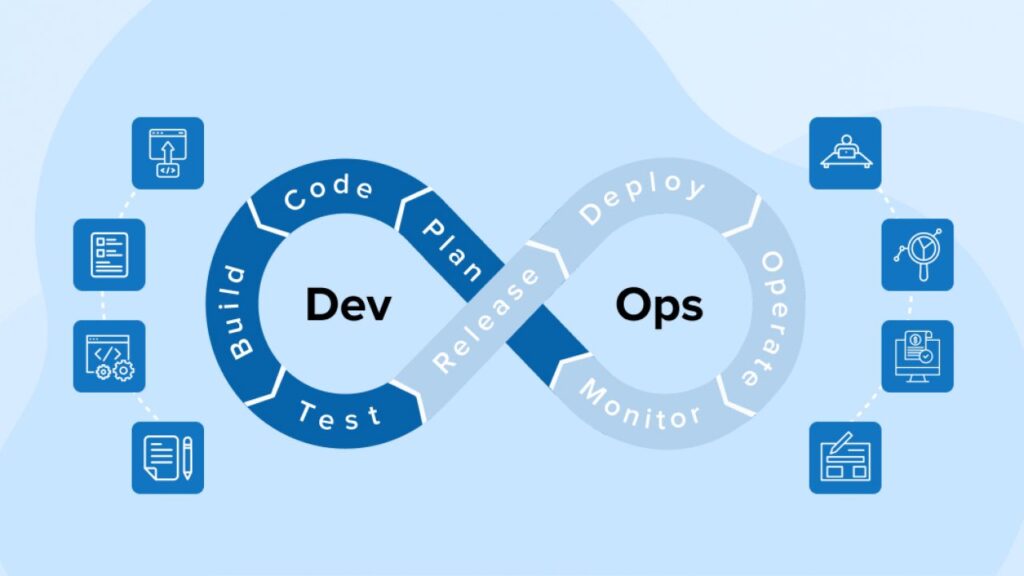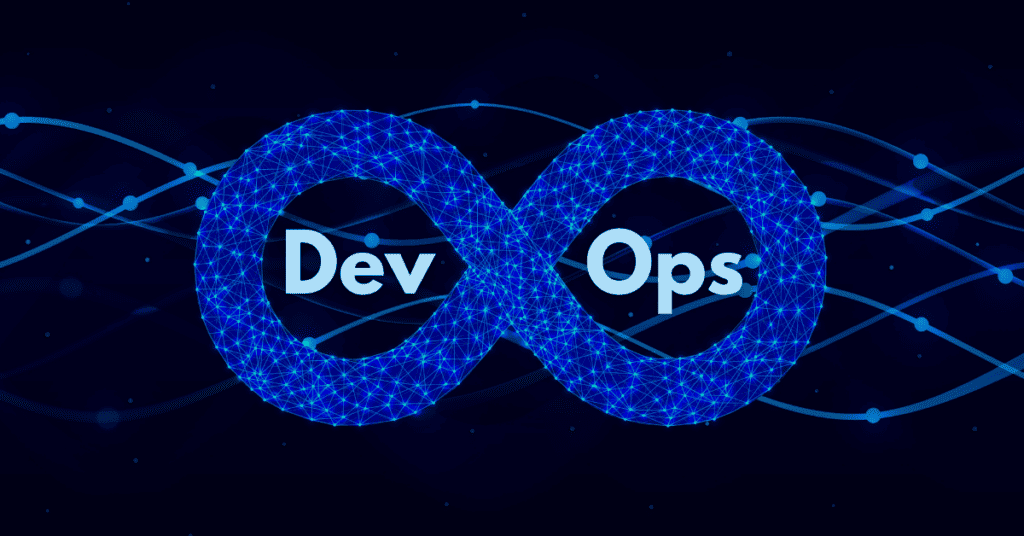Level up your business with US.
- Home
- How DevOps is Powering Faster Product Releases in 2025
How DevOps is Powering Faster Product Releases in 2025
July 12, 2025 - Blog
How DevOps is Powering Faster Product Releases in 2025
Mobile app development has evolved far beyond code and creativity. In today’s landscape, successful apps must meet high expectations: lightning-fast performance, reliable updates, security compliance, and seamless user experience. Traditional development models struggle to keep pace, especially as teams grow and user demands increase.
That’s why DevOps as a Service (DaaS) has become essential for mobile development in 2025. By integrating development and operations practices and offering them as a managed service, DaaS empowers mobile teams to release updates faster, fix issues quickly, and scale efficiently — all while maintaining high standards of quality and security.
In this blog, we’ll break down what DevOps as a Service means for mobile development, its benefits, best practices, and how Code Driven Labs helps startups and enterprises implement DaaS to deliver standout mobile applications.

What Is DevOps as a Service?
DevOps as a Service provides a managed set of tools, processes, and expertise that bring together development and operations teams. Instead of building your DevOps pipeline in-house, a third-party partner — like Code Driven Labs — sets up and manages the entire infrastructure, automation workflows, CI/CD pipelines, testing systems, monitoring, and security processes.
For mobile development, DevOps as a Service focuses on:
-
Continuous Integration (CI): Automating build, testing, and merging of code
-
Continuous Delivery (CD): Automating deployment to staging and production environments
-
Infrastructure as Code (IaC): Provisioning cloud infrastructure programmatically
-
Monitoring and Logging: Real-time visibility into app health and user behavior
-
Release Management: Orchestrating updates across platforms without downtime
Why DevOps is Crucial for Mobile App Development
Unlike web or desktop applications, mobile apps present unique challenges:
-
App Store Delays: Submissions to Apple App Store and Google Play introduce delays
-
Version Fragmentation: Users update apps at different times, causing compatibility issues
-
Device Diversity: Thousands of devices with different screen sizes, OS versions, and hardware
-
User Expectations: Users expect flawless performance and zero downtime
DevOps practices help mobile teams handle these complexities through automation, monitoring, and rapid feedback cycles.
Key Benefits of DevOps as a Service for Mobile Teams
1. Faster Release Cycles
With CI/CD pipelines in place, code changes can be built, tested, and deployed automatically. This reduces the manual overhead of preparing releases and shortens time-to-market.
2. Early Bug Detection
Automated testing and real-time monitoring allow teams to identify and fix issues before they affect users, reducing the risk of bad app reviews or crashes in production.
3. Scalability
As user demand grows, DevOps tools enable seamless scaling of infrastructure and backend services to support new traffic without performance degradation.
4. Improved Collaboration
DevOps bridges the gap between developers, QA engineers, designers, and operations teams. This improves communication, transparency, and accountability.
5. Better User Experience
With continuous monitoring, performance alerts, and faster bug resolution, apps remain stable and responsive — improving user retention and app store ratings.
6. Security and Compliance
DevOps pipelines integrate security checks, vulnerability scans, and audit logs into the development process, ensuring apps meet compliance standards like GDPR or HIPAA.
Core Components of Mobile DevOps as a Service
To build an efficient mobile DevOps environment, these components must be integrated:
A. Continuous Integration
-
Tools: GitHub Actions, Bitrise, Jenkins, CircleCI
-
Benefits: Immediate feedback on code quality, reduced integration issues
B. Continuous Delivery
-
Automates app builds and uploads to internal testing platforms or app stores
-
Supports staged rollouts to reduce risk
C. Automated Testing
-
Unit tests, UI tests (using Espresso/XCUITest), integration tests
-
Reduces regression issues and improves confidence in code changes
D. Containerization & Infrastructure
-
Use of Docker and Kubernetes to deploy and manage services like APIs and backends
-
Supports multi-environment deployment (dev, staging, production)
E. Monitoring and Logging
-
Tools: Firebase Crashlytics, Sentry, Datadog, Prometheus
-
Track crashes, latency, error rates, and usage patterns
F. Analytics and Feedback
-
Integrations with tools like Mixpanel, Google Analytics, Amplitude
-
Real-time insights into user behavior to guide product decisions
DevOps Challenges in Mobile Development
Despite its benefits, DevOps in mobile development comes with hurdles:
-
App store restrictions delay releases and limit rollback options
-
Dependency management is harder across multiple platforms (Android/iOS)
-
Automation can be complex when integrating with legacy systems or custom APIs
-
Team training is essential to adapt to continuous delivery culture
That’s why many companies turn to DevOps as a Service providers to bridge the gap — delivering prebuilt solutions, automation expertise, and continuous support.
How Code Driven Labs Helps with DevOps for Mobile Development
Code Driven Labs offers tailored DevOps as a Service solutions specifically optimized for mobile development. Whether you’re building a new app or scaling an existing one, their approach ensures faster delivery, improved quality, and operational efficiency.
Here’s how they help:
1. DevOps Assessment and Roadmap
Code Driven Labs begins with a detailed analysis of your current development process. They identify gaps, inefficiencies, and risks — then craft a tailored DevOps roadmap focused on automation, integration, and scalability.
2. Custom CI/CD Pipeline Setup
Their team sets up robust, cloud-based CI/CD pipelines for Android and iOS using tools like Bitrise, Fastlane, GitHub Actions, or Jenkins. This includes:
-
Auto-build and testing on every commit
-
App signing and packaging
-
Push to internal testers or stores
-
Notifications and dashboards
This streamlines the development lifecycle from commit to release.
3. Automated Testing Implementation
Code Driven Labs integrates end-to-end testing into your pipeline, ensuring code is validated continuously. They help you build test suites for:
-
Unit tests
-
API integration
-
Cross-platform UI automation
-
Performance and stress testing
4. Infrastructure as Code and Cloud Optimization
Need a backend or API for your app? Code Driven Labs helps you deploy and manage scalable infrastructure using Terraform, AWS, Azure, or Google Cloud — all managed as code for consistency.
They also containerize services (Docker) and manage deployment through Kubernetes, enabling high availability and scalability.
5. Real-Time Monitoring and Crash Reporting
Using tools like Crashlytics, Sentry, and DataDog, Code Driven Labs enables real-time performance and crash monitoring. Their DevOps dashboards help you:
-
Track key metrics
-
Investigate bugs
-
Measure update success
-
Ensure app reliability
6. Security and Compliance Automation
Code Driven Labs embeds security into every phase of the pipeline — from code scanning and dependency audits to encrypted credential management and role-based access control.
This ensures compliance with industry standards and reduces vulnerabilities.
7. Training and Support
DevOps isn’t just tools — it’s culture. Code Driven Labs trains your team to work with new systems, respond to alerts, and maintain DevOps best practices long after initial setup.
Real-World Outcomes
With Code Driven Labs managing DevOps for mobile, teams can expect:
-
40–60% faster release cycles
-
70–80% reduction in deployment errors
-
Improved app store ratings through fewer crashes
-
Faster time to market for new features
-
Higher developer productivity and morale
These improvements directly impact business metrics like user acquisition, retention, and revenue.

Final Thoughts: DevOps Is No Longer Optional
As mobile development becomes more complex and competitive, delivering high-quality apps quickly and reliably is no longer a luxury — it’s a necessity. DevOps as a Service offers a powerful way to automate delivery, reduce risk, and continuously improve.
Code Driven Labs brings both the strategic expertise and hands-on execution needed to make DevOps work for mobile development teams of all sizes. From infrastructure and automation to monitoring and support, they help you ship faster, with confidence.
